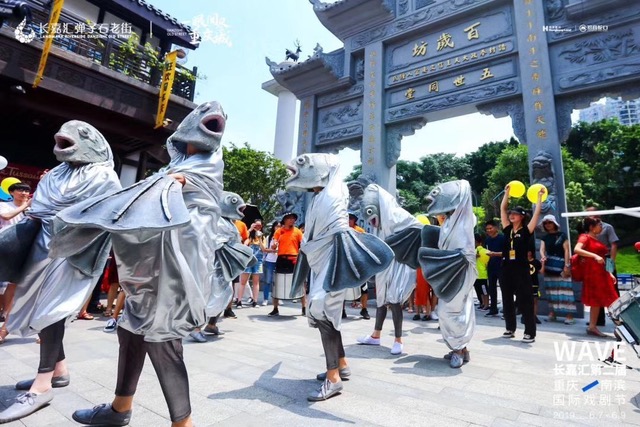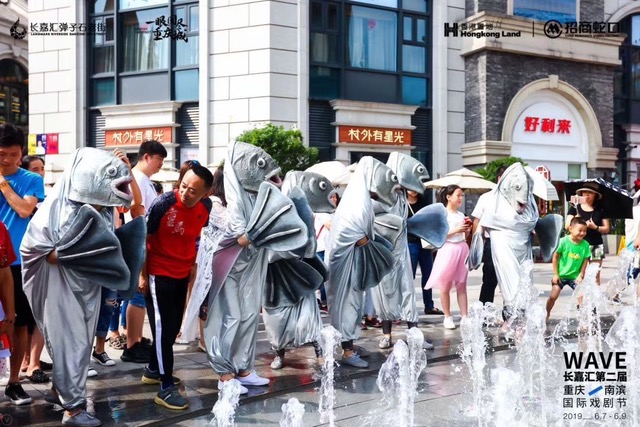
It is a weekday like any other, and you are queuing for a cash machine. You turn around to check if there is anyone behind you, and a six-foot-tall fish is trying to get their card out of their wallet - a tough task for anyone with fins.
Such is the charmed world that Surge enables people to live in through the art of street theatre. Surge is an organisation based in Glasgow dedicated to running projects to develop street arts, physical theatre and circus in Scotland.
Melanie Jordan is Physical Theatre Practitioner at Surge, and we had the opportunity to speak with her on the importance of street theatre as well as their recent trip to Chongqing in China.
Jordan’s first experience with street theatre was one that many have shared – the Covent Garden street performers. It was following her studies at Queen Margaret University, however, that her passion for it truly came to light.
“I don’t think I realised what street theatre could be until I started to investigate Surge as a company. I think in Edinburgh there’s a great tradition of buskers and of circle shows which are so brilliant and vibrant, but also street theatre can be so much more than that.
I think as a company we really try and champion that work that pushes the boundaries of what street theatre can be, and not just on the street but in any outdoor setting or site-specific work, or just in a non-traditional theatre space.”
Surge works on a number of projects every year to push those boundaries and explore the nature of theatre. One such project is the Community Street Theatre Tour, which takes existing acts of varying levels of difficulty to communities and groups who haven’t tried street theatre before.
“Street theatre is beautifully democratic in terms of getting theatre to audiences. It’s free most of the time, the audience can just come across it, and if they don’t like it, they can just leave. It really breaks down those barriers in terms of social and economic deprivation which I think is very important at the moment.”- Melanie Jordan, Surge
Through this project, they’ve worked with people from all walks of life - from farmers on Mull to youth groups in Easterhouse – and in June of this year they had the opportunity to take it to Changjiahui Theatre Festival in Chongqing in China, following an invite from Alchemy Theatre & Arts Studio.
“This was a really exciting opportunity for us to take an act that’s been developed in Scotland to China and work with Chinese participants, and then for them to put their own interpretation on it and then to perform at a local festival in Chongqing in China, which was lovely, such a gorgeous experience.”
The act in question was Fish Fandango, which works on the premise that a shoal of giant fish think they are people and attempt to go about normal daily life with that in mind.
Activities like shopping trips, sitting in cafes and walking dogs are all undertaken fully masked as the shoal lives out its desire to be human.
Surge spent two days working with five Chinese participants, before the act featured at the festival they had been invited to participate in as part of a programme of performers from all over the world.
“The audience was absolutely enormous. It felt like people were really excited about it, and everyone came out for it. There were points where I was directing the show and the fish were out doing their thing, and then I would turn away for one moment, turn back and be unable to see them because there was such a massive crowd around them.”

The nature of physical theatre translates particularly well to international audiences as the usual barriers of language are not an issue – the concepts and emotions being portrayed are often universal, regardless of country or culture.
“It’s a non-verbal act, which meant it could be understood by everyone watching it. When it came to working with the participants, we had a translator with us as well which was really helpful, but what was beautiful was the language of physical theatre and having this universal way of being able to communicate through mime and through improvisation and games.”
Jordan also participated in a forum on diversity in the arts during her time at the festival, which allowed her to reflect upon the nature of festivals within Scotland.
“I got asked quite a lot about what Scotland is like in terms of festivals and culture, and it was beautiful to have the opportunity to reflect on the culture of festivity that we have in Scotland and how we do festivals so well, in all kinds of different art forms.”
Jordan has always been keen to break out of traditional theatre practices, and a key reason for this is because of the accessible nature activities like street and physical theatre hold. Not only do they tend to carry meaning across languages, but they also help to bring theatre to those who would perhaps not normally experience it.
“Street theatre is beautifully democratic in terms of getting theatre to audiences. It’s free most of the time, the audience can just come across it, and if they don’t like it, they can just leave. It really breaks down those barriers in terms of social and economic deprivation which I think is very important at the moment.”
Find out more about Surge over on their website and social media:
Images courtesy of Surge